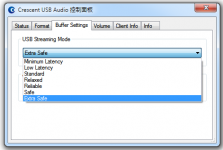My unit was registered fine in W10 as well, but there was either no i2s output at all or very distorted. After soldering the USB connection directly to the board it works fine.
Hi Weissi,
I have the same module with the USB connector soldered directly on the board and had similar distortion issues when using crappy USB cables. If you still have this issue you can try to increase the buffer size. Crescent custom driver for Win7 support this.
Please note that XMOS is a high-speed USB device compared to PCM270X for example which is only full-speed. High speed USB devices routing is much more critical. I guess you have buffer underflow/overflow due to poor USB routing.
Regards,
Plamen
I have the same module with the USB connector soldered directly on the board and had similar distortion issues when using crappy USB cables. If you still have this issue you can try to increase the buffer size. Crescent custom driver for Win7 support this.
Please note that XMOS is a high-speed USB device compared to PCM270X for example which is only full-speed. High speed USB devices routing is much more critical. I guess you have buffer underflow/overflow due to poor USB routing.
Regards,
Plamen
Attachments
Last edited:
Coming back to this with measurements from the oscilloscope.
Both boards into PCM1794A. The CM6631A works. The XMOS doesn't.
CM6631A
LRCK -> 44.1Hz
SCK -> 11.23MHz
BCK -> 5.64MHz
XMOS
LRCK -> 44.1Hz
MCK -> 22.72MHz
BCK -> 2.8MHz
Both boards into PCM1794A. The CM6631A works. The XMOS doesn't.
CM6631A
LRCK -> 44.1Hz
SCK -> 11.23MHz
BCK -> 5.64MHz
XMOS
LRCK -> 44.1Hz
MCK -> 22.72MHz
BCK -> 2.8MHz
